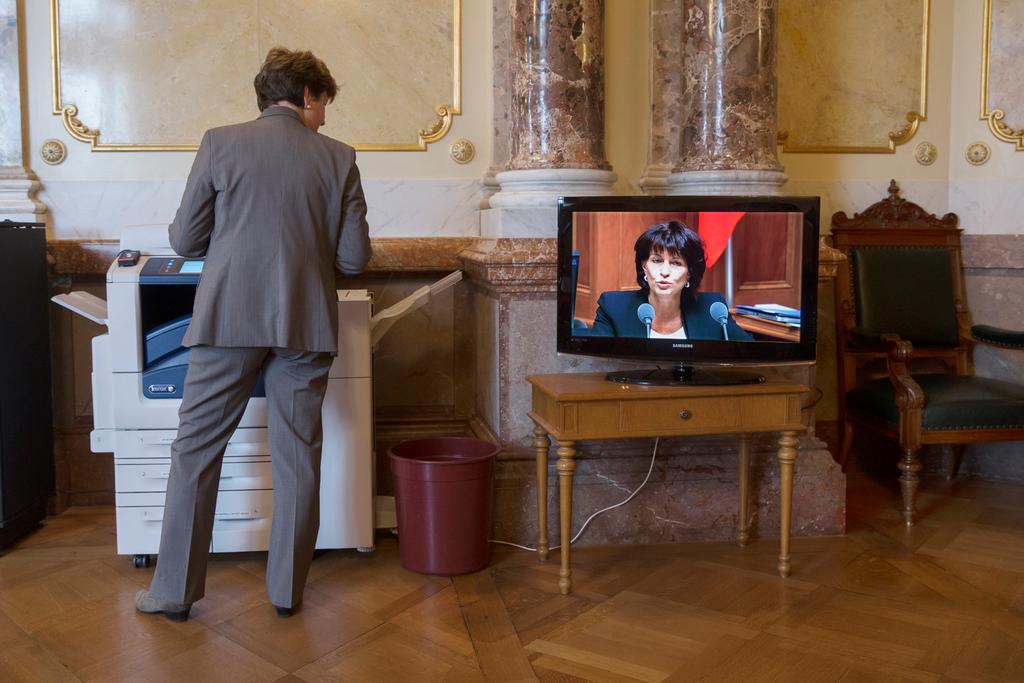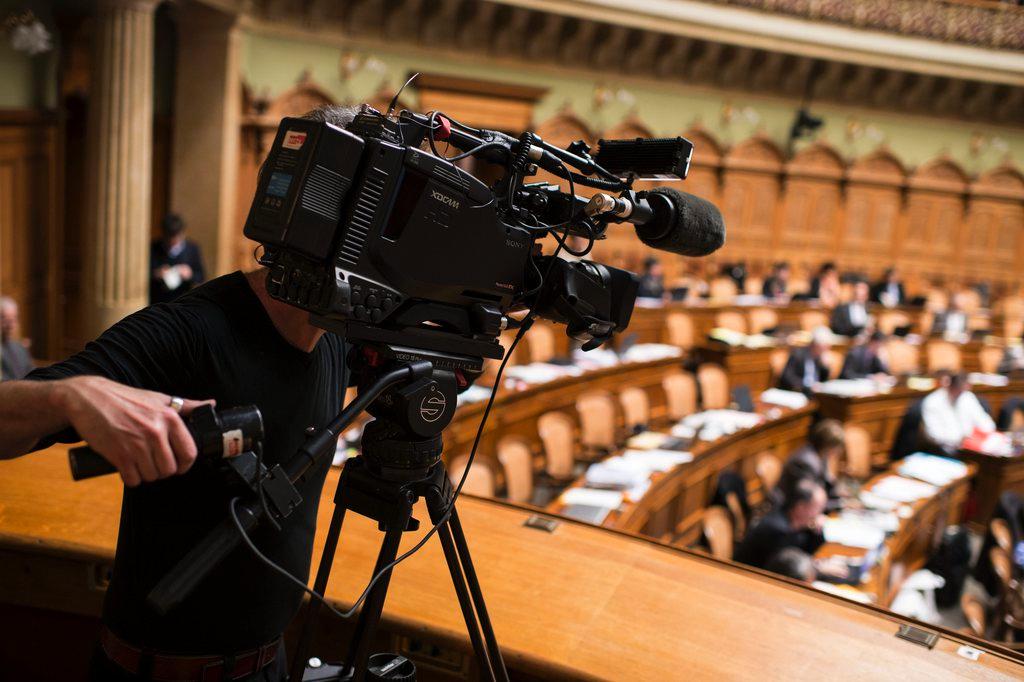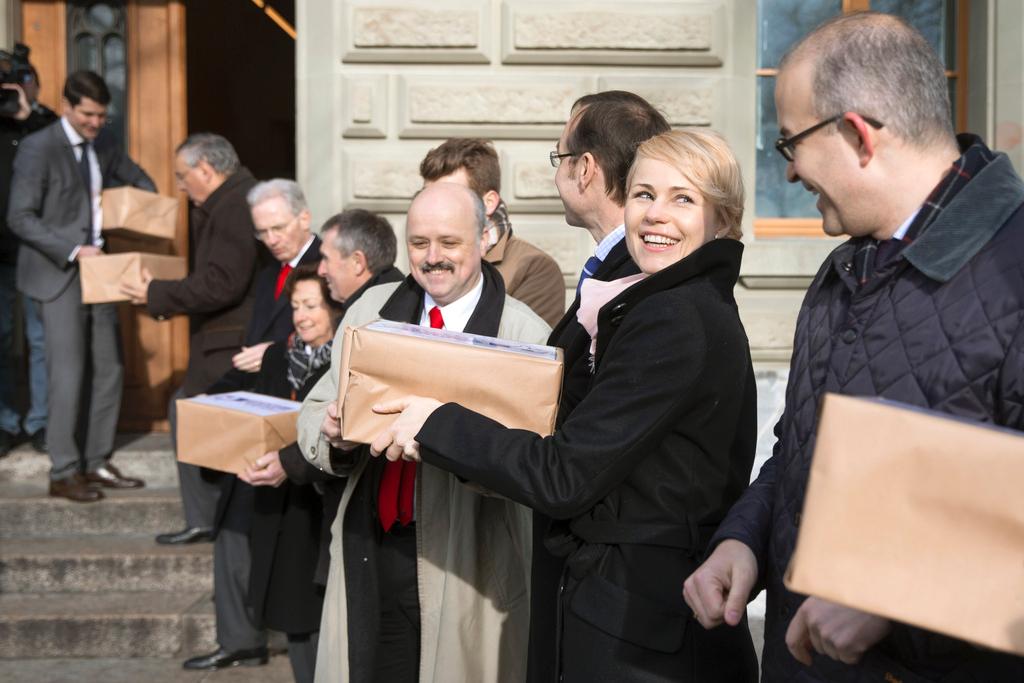Wafer-thin majority votes for public radio/TV funding reform

Voters have narrowly approved a controversial change to Switzerland’s public radio and television funding system. Sunday's outcome is one of the closest results in decades.
Final results of the nationwide ballot show less than 50.1% of voters adopting the reform – a margin of about 3,200 votes.
The leading GfS Bern research and polling institute says many German-speaking regions as well as Italian-language canton Ticino came out against, while most French-speaking cantons approved the reform.
Communications Minister Doris Leuthard told journalists that the government welcomed the approval, but the debate on public service media would no doubt continue.
“We’re looking forward to a broad discussion particularly with the younger generations. It is fundamental to have an independent media offer in all language regions of the country,” she said.
GfS Bern political analyst Claude Longchamp described the close result as “a victory of sorts for conservative opponents of the reform”.
The Association of Small and Medium-sized Enterprises (SMEs) which forced the nationwide vote says a thorough review of the scope of public media providers was overdue.
“The government must keep its word and launch the debate swiftly,” a statement said. The association also called for more transparency about the cost of individual programmes to reduce the licence fee.
The Swiss Broadcasting Corporation’s director general, Roger de Weck, said the result was not a warning shot but a step for welcome discussions on public service media.
“It was simply a vote on a modern funding system for the media.”
Parliament agreed last year to switch the current financing system, but the SME association challenged the decision, arguing that the reform is flawed.
The new system foresees that all households, including businesses, pay an annual licence fee in principle, with or without a radio or TV set.
Online access
Proponents of the reform, which was launched by the government, say that with widespread internet use, notably on mobile devices, everybody has access to programmes of the publicly funded SBC – the parent company of the multimedia platform swissinfo.ch.
Under the current scheme a fee is only paid by households and companies which have a TV and/or a radio on their premises.
Opponents, mainly on the political right, argue the reform would cement the position of the SBC for its traditional programming – 25 radio and TV stations – as well as its five different online offerings, at the expense of the private media.
However, supporters say a strong public broadcaster is crucial for a country like Switzerland with four different language groups – German, French, Italian and Romansh.
It is estimated that the revised system would generate revenue of CHF1.3 billion ($1.4 billion) annually – about 6% of which would go to private, regional media.
Populist
The campaign in the run-up to voting day was marked by combative advertising and an unusually harsh style, with opponents warning of a large increase in fees.
Vote June 14, 2015 – Final results:
Funding of public radio/TV: approved
Yes: 50.1.% No: 49.9.%
Preimplantation genetic screening: approved
Yes: 61.9.% No: 38.1%
Nationwide inheritance tax: rejected
Yes: 29.0% No: 71.0%
Harmonising student grants: rejected
Yes: 27.5% No: 72.5%
Turnout: 43.1.%
28,860 of the 196,900 voters eligible for an ongoing trial with e-voting used the possibility: That is about 14.7%.
They argued that the SBC licence for households – to be set at CHF400 – could soon be increased to CHF1,000 per year, dismissing pledges by supporters that the fee will actually be lower compared to the current rate of CHF451.
In particular SMEs would be confronted with high costs for their licence fees, according to the opponents’ campaign.
For their part, promoters of the amendment pointed out that small companies – those with a turnover less than CHF500,000 annually – would be exempted altogether.
The government has also been criticised for scheduling the vote before there has been a proper debate reviewing the objectives and definition of the public service provided by the SBC.
Public service
Sunday’s vote came amid increasing criticism of the SBC. A committee, made up of members of the People’s Party and the youth section of the Radical Party, are collecting signatures for an initiative to do away with radio and TV licence fees altogether.
A government advisory media commission is due to present a report on the role of public service providers by next year according to Leuthard.
Neighbouring Germany became the first European country to revise its funding system for public broadcasting two years ago.
Similar moves are being considered or are underway in Britain, Sweden, Ireland and the Netherlands.
Sunday’s vote was the last set of nationwide ballots this year and comes ahead of parliamentary elections in October.
Four separate issues featured on the ballot sheet on June 14:
A proposal, supported by the centre-left, to introduce a nationwide inheritance tax.
A constitutional amendment to allow the genetic screening of IVF embryos.
An initiative to harmonise student grants across the country.
A referendum against a parliamentary decision to reform the funding of public radio and television.

In compliance with the JTI standards
More: SWI swissinfo.ch certified by the Journalism Trust Initiative











You can find an overview of ongoing debates with our journalists here . Please join us!
If you want to start a conversation about a topic raised in this article or want to report factual errors, email us at english@swissinfo.ch.